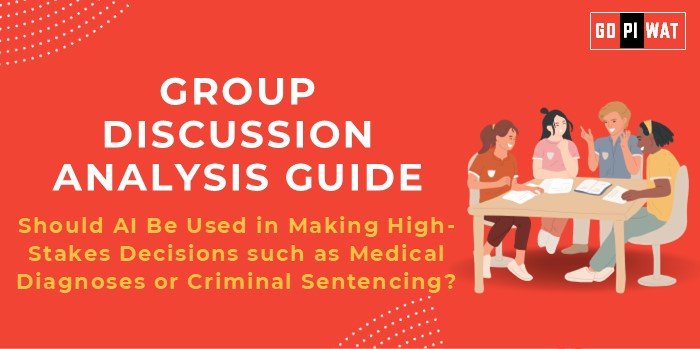📋 Group Discussion (GD) Analysis Guide: Should AI be Used in Making High-Stakes Decisions such as Medical Diagnoses or Criminal Sentencing?
🌐 Introduction to the Topic
- 🔍 Opening Context: Artificial intelligence is rapidly transforming industries, with its applications stretching from simple automation to high-stakes domains like healthcare and criminal justice. The ethical and operational implications of AI in these fields make it a critical discussion for future leaders.
- 💡 Background: AI’s role in decision-making has seen increased adoption, with algorithms aiding medical diagnostics and judicial predictions. However, concerns about bias, accountability, and societal impact persist, fueling a global debate.
📊 Quick Facts and Key Statistics
🏥 AI in Healthcare: 94% of hospitals use AI-based systems globally for preliminary diagnostics (Statista, 2023).
⚖️ Bias in AI: A 2021 MIT study found racial bias in AI sentencing tools, with error rates up to 35% higher for minority groups.
💰 Economic Impact: AI could add $13 trillion to global GDP by 2030, yet 30% of industries still face ethical AI challenges (McKinsey, 2022).
⚖️ Bias in AI: A 2021 MIT study found racial bias in AI sentencing tools, with error rates up to 35% higher for minority groups.
💰 Economic Impact: AI could add $13 trillion to global GDP by 2030, yet 30% of industries still face ethical AI challenges (McKinsey, 2022).
🛠️ Stakeholders and Their Roles
- 🌍 Governments: Define regulations and frameworks for ethical AI deployment.
- 🏥 Healthcare Providers: Utilize AI for diagnostics while ensuring patient safety.
- ⚖️ Judicial Systems: Incorporate AI tools while maintaining human oversight.
- 💻 AI Developers: Create transparent, bias-free algorithms.
🏆 Achievements and Challenges
✨ Achievements
- 🩺 Enhanced Diagnostics: AI detects breast cancer with 99% accuracy (Nature, 2022).
- 🔍 Crime Prediction: Predictive policing reduced crimes in Chicago by 15% (2019).
⚠️ Challenges
- ⚖️ Ethical Dilemmas: Bias in judicial algorithms leading to unfair sentencing.
- 📉 Accountability Issues: Difficulty attributing errors in AI-based decisions.
🌎 Global Comparisons:
✅ Success: Estonia uses AI to resolve minor legal disputes efficiently.
❌ Failure: The UK faced backlash over biased AI in university admissions (2020).
🧪 Case Study: IBM Watson Health revolutionized cancer diagnosis but faced issues with data accuracy and generalization.
✅ Success: Estonia uses AI to resolve minor legal disputes efficiently.
❌ Failure: The UK faced backlash over biased AI in university admissions (2020).
🧪 Case Study: IBM Watson Health revolutionized cancer diagnosis but faced issues with data accuracy and generalization.
📄 Structured Arguments for Discussion
- 🟢 Supporting Stance: “AI can enhance decision-making efficiency and reduce human error, crucial in medical and legal contexts.”
- 🔴 Opposing Stance: “AI’s inherent biases and lack of transparency make it unsuitable for high-stakes decisions.”
- ⚪ Balanced Perspective: “AI should augment, not replace, human decision-making, ensuring accountability and fairness.”
🗣️ Effective Discussion Approaches
- 📊 Opening Approaches:
- 📈 Begin with a statistic: “AI can detect diseases like breast cancer with over 99% accuracy.”
- ⚖️ Highlight an ethical issue: “Should an AI system decide life-or-death situations like criminal sentencing?”
- 🔄 Counter-Argument Handling:
- 📊 Bias in AI: Acknowledge and suggest stricter testing and training data diversification.
- ⚖️ Accountability Concerns: Propose hybrid models combining AI tools with human oversight.
🔍 Strategic Analysis of Strengths and Weaknesses
- 💪 Strengths: Efficiency, error reduction, scalability.
- ⚠️ Weaknesses: Bias, lack of empathy, ethical dilemmas.
- 🌟 Opportunities: Collaboration in hybrid decision-making systems.
- 🚨 Threats: Public mistrust and misuse.
🎓 Connecting with B-School Applications
- 🌟 Real-World Applications: AI’s role in operational decisions, healthcare innovations, and ethical business management.
- ❓ Sample Interview Questions:
- “How can ethical concerns in AI be addressed in decision-making?”
- “Should businesses rely on AI for strategic decisions?”
- 💡 Insights for Students: Understanding AI ethics is crucial for leadership in tech-driven industries.


